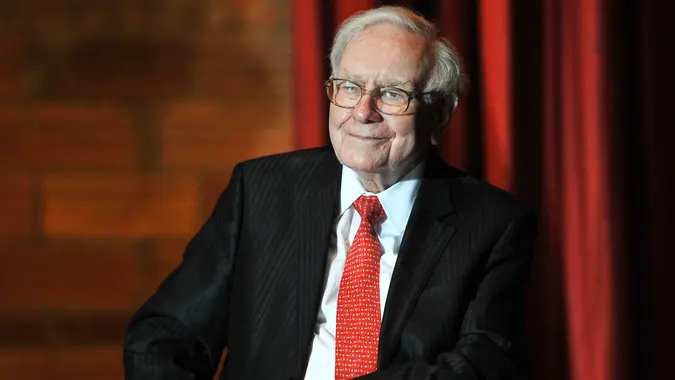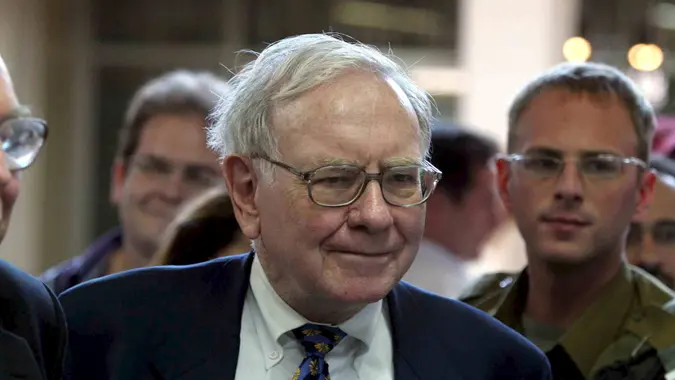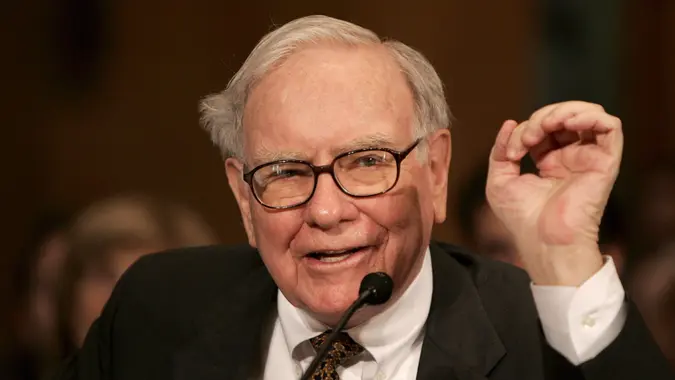You Can’t Earn Your Way to Financial Freedom: Why You Should Invest

Commitment to Our Readers
GOBankingRates' editorial team is committed to bringing you unbiased reviews and information. We use data-driven methodologies to evaluate financial products and services - our reviews and ratings are not influenced by advertisers. You can read more about our editorial guidelines and our products and services review methodology.

20 Years
Helping You Live Richer

Reviewed
by Experts

Trusted by
Millions of Readers
If your plan for building wealth is to move up the ladder at work or take on a side hustle, you might want to revisit your strategy. Financial experts suggest investing is the only guaranteed way to achieve true financial independence.
“While a higher income makes it easier to budget, live comfortably, and not have to overthink every time you need to spend money, investing is still one of the best ways to reach financial freedom,” said Dr. Enoch Omololu, a financial coach at Snappy Rates.
He and other experts explain why investing is your best strategy.
Investing Keeps You Ahead of Inflation
Omololu finds himself repeating a phrase to his clients often that “investing is the great equalizer.”
For one thing, it helps you stay ahead of high inflation, he said.
“Unless your wages keep up with inflation annually, your income has a lower purchasing power with each passing day. To grow your money in real terms, you want to be invested in the stock markets,” he said.
It Builds Compound Interest
Investing also “unleashes the power of compound interest to your benefit,” Omololu said.
Instead of keeping your money in a traditional savings account where it grows slowly, you can amplify potentially higher returns in the stock market over time by staying invested.
“Over several years, you’d be surprised at how much you can grow your net worth by just relying on compounding growth,” he said.
It Could Shorten Your Working Years
“If you don’t want to work full time at a job you don’t enjoy for 40 or more years, investing can help you retire early by creating passive income streams you can live on, including dividends, capital gains and more,” Omololu said.
With the right setup, you won’t need to spend tons of time managing your portfolio. It can be almost set-and-forget using index funds.
It Maximizes the Value of Your Money
Many people believe that just saving their money is a safe bet, but according to Carla Adams, financial advisor and founder of Ametrine Wealth, “[T]he value of your money is eroding relative to inflation by not investing.”
While inflation has been very high in recent years, with everyday purchases becoming noticeably more expensive, she said that as inflation reverts to its long-term average of 2% to 3% annually, it will again become “easy to dismiss.”
“The world of technology and innovation that we live in today can also skew our perception of inflation. Take the cost of flat-screen TVs for example, which in the early 2000s were far more pricey than they are today, despite inflation being alive and well, due to technological developments making them cheaper….”
But the fact is, groceries, gas, clothing, housing and healthcare all steadily continue to rise in price and have a much bigger impact on people’s finances.
The Risks Are Worth the Rewards
Adams insisted that the risk of investing in the stock market comes with reward.
“And if you have a long time horizon before you need that money — say 10 plus years until you will need your retirement funds — the chances are, the stock market will be higher than it is today.”
She said the stock market returns average about 10% per year.
“This means you can literally double your money every 7 years (on average) if you are invested in a highly diversified 100% equity portfolio.”
Invest In Alternative Assets
Long-term wealth and financial security won’t happen by traditional savings, or even mutual funds and simple retirement plans, according to Kelly Ann Winget, investment expert and founder and CEO of Alternative Wealth Partners.
The sad fact is, your cash loses value every day, especially in the high-inflation world we are living in today, Winget said.
“The high-yield accounts are OK for now, but those can change any time as the Fed moves rates down.”
Instead, “[a]lternative assets have been used by high-net-worth/ultra-high-net-worth individuals, family offices, endowments, and pension funds to protect and grow wealth since the beginning of time. When it comes to saving for retirement, the old ways aren’t going to get you there,” she said.
Find a Balance
However, you do need to have access to some form of cash in case of emergency, Winget said.
“Save enough to support you through something minor — have insurance and credit available to support yourself through something catastrophic, and focus on generating returns between 8%-15% on the rest of your available cash.”
Become Tax Savvy
Equally important to building wealth is figuring out your tax and estate planning, Winget said.
“Paying 20%-40% of your income in taxes every year eats away at what you could be putting into savings, investments, and retirement.”
She recommended people learn the tax code or hire a professional who can understand their specific situation to strategically structure their finances for optimal tax protection.
“Everyone is on different financial journeys and these strategies are meant for people who are focused on retirement and can comfortably support themselves. If you are living paycheck to paycheck or beyond, then upskilling, budgeting, and financial literacy (banking, credit, debt, etc) should be your first priority,” she concluded.
More From GOBankingRates
 Written by
Written by  Edited by
Edited by 

























